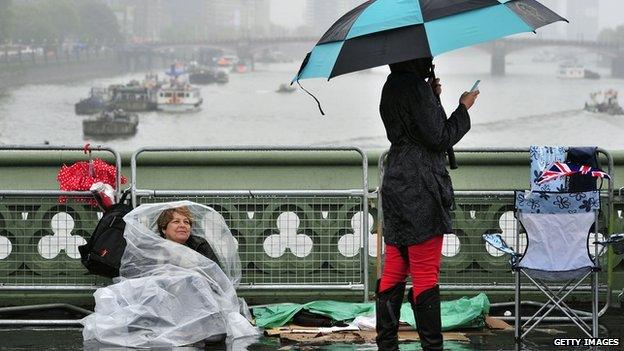The end of the stiff upper lip?
- Published

This would seem to be an example of stiff upper lip
Unblinking fortitude in the face of adversity and hardship - or the suppression of boiling emotion - is referred to in the UK as stiff upper lip. But is this really a distinctively British characteristic and is it still firmly in place, asks Ian Hislop.
There was a moment when I stood in the pouring rain watching the Royal Flotilla during the Diamond Jubilee when I thought I might be on to something.
After five hours getting completely soaked, the people next to me were still happily pointing out the little boats that had been to Dunkirk or the motor boat that had taken part in the Normandy landings or leading a huge cheer for a barge containing an Indian band in kilts playing the bagpipes.
The weather in Britain does tend to bring out a sort of mad, masochistic defiance in people. But on this occasion I thought that everyone, from the elderly Queen and the Duke of Edinburgh, who refused to sit down, to the massed choirs who belted out their anthems with dripping hair and running mascara, to the crowds with their umbrellas and thermos flasks of tea, was taking part in a grand pageant of stoicism.
The fact that it resulted in the duke being hospitalised and various boat crews being treated for hypothermia only seemed to add to its appeal.
I enjoyed the whole thing greatly even though I was aware of the fact that it was slightly bonkers. Over centuries, the British have come to be seen by others and to see themselves in terms of reserve, resilience and restraint.
But this has not always been the case. When the Dutch scholar Erasmus came to London at the turn of the 16th Century he wrote home in amazement, describing how the English spend the whole time kissing each other. "Wherever you move there is nothing but kisses," he noted.
Italian visitors in the Elizabethan period remarked upon how emotional everyone was and how we lacked self control. And it was the French who had words like "sang-froid" and "insouciance" to describe qualities that the British did not yet appear to possess.
In the 18th Century the word "sentimental" was not pejorative in this country. It was a term of praise for a person of taste and refinement who displayed their emotions openly. The nation which would become known for its ability to "keep calm and carry on" had yet to appear.
The evolution of the stiff upper lip is unexpectedly complex - emerging out of the French revolution and the Napoleonic wars as a reaction to what Britain's rulers felt was a dangerous unleashing of unrestrained passion on the continent.
Taking the lead from the prototypical Duke of Wellington, this model of stoic self-control was then rolled out from top to bottom of society. It then flourished in the imperial heyday with a parade of unflappable Victorian soldiers, explorers, and administrators who were supported by an equally tough cast of long-suffering women and doughty memsahibs.
The story turns tragic in World War I as a whole uncomplaining generation seemed to walk straight into the enemy guns before struggling on for four hellish years.

The Blitz: Keep calm and deliver an extra pint
In the aftermath of the carnage it seemed as though the stiff upper lip was finished for good. But it was consciously revived in the Great Depression as a unifying national identity and then reinvented with a smile in the legendary cheery spirit of the Blitz.
After WWII came austerity but the arrival of prosperity in the 1950s, and then the rapid social change of the 1960s, left the stiff upper lip looking old-fashioned and even more so when the "me generation" embraced therapy and "letting it all hang out".
The nadir came in the events surrounding the death of Diana when the entire nation seemed to decide that dated notions of reserve, decorum and restraint were to be abandoned in favour of emotional release.
The writer and historian AN Wilson says "the greatest factors in the development of the stiff upper lip were English public schools and Scottish Presbyterianism". That more or less covers my education and background.
Having sat through Latin lessons studying Aeneas as a model of stoical leadership, and having a grandfather who was a member of Glasgow Boys Brigade, fought in Flanders, and was a stern lay-preacher, you could argue that I am no great expert on emotional literacy.
But one can analyse the strengths and weaknesses of the stiff upper lip by examining sources as varied as the novel Robinson Crusoe and the Battle of Britain sketches in Beyond the Fringe.
Everything from Victorian newspaper parodies about over-emotional policemen to the reaction to the first sexually explicit British edition of Cosmopolitan magazine can provide evidence.
So can the HG Wells film Things to Come about futuristic air raids, and the classic British Character cartoons of Pont, external between the wars.
The story of the stiff upper lip is a remarkable one. It may not be over.
Here is a selection of readers' examples of the stiff upper lip.